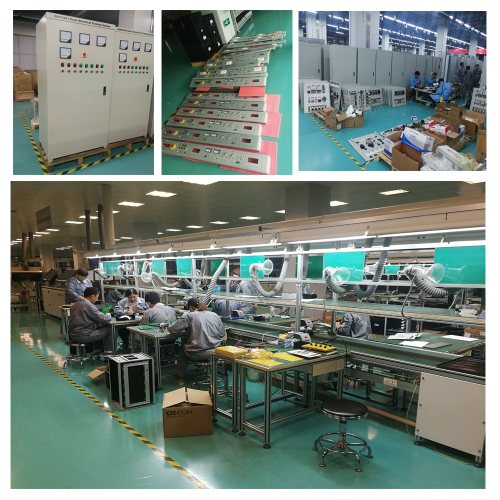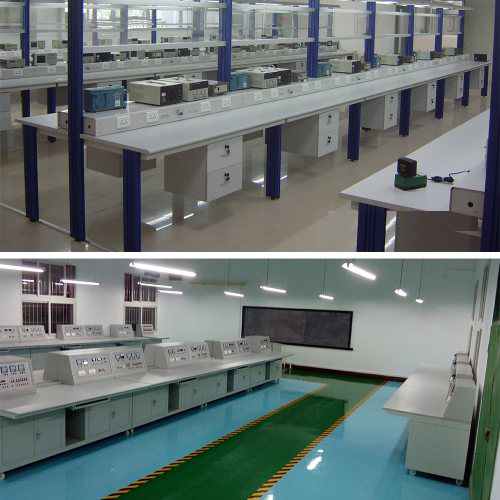MR243E Motor Control And Electrical Drive Workbench Vocational Education Equipment For School Lab Electronic Trainer Kit
1 Product overview
1.1 Overview
This training workbench include various motor application circuit, through experiment, students will be familiar with motor features, mater control principle and control method. It stress on hand on operation ability, and training practice. It’s suitable for college, technical schools, university, training institute.
1.2 Character
(1)Training workbench use aluminum column structure frame, it include meter box and power box to test and measure technical parameter, it is easy to use and it is not easy to be broken.
(2) Equipped with motors, students can make combination, and finish many training contents.
(3)Training workbench has high safety system.
2 Technical parameter
(1) Input power: three, five wires,380V±10% 50Hz
(2) Dimension: 1600mm×800mm×1750mm
(3) Whole capacity:<2.0KVA
(4) Weight: <300kg
(5) Work condition:
Environment temperature:-10℃~+40℃, Relative humidity: <85%(25℃)
 3 Product consist of
3 Product consist of
3.1 Power control panel
Power control panel use aluminum structure metal panel, all close type boxes structure
3.2 Training workbench
Training workbench use aluminum structure. There are universal 4 wheels at the bottom of workbench, there are 2 breakers on wheel. The trainer can be moved or stop convenient . The workbench panel thick is 25mm high density substrate , there is high temperature high pressure anti-fire treatment process. It equip with three guide rail type drawer, 2 push and plug cabinet. The structure is sound and reliable, outlook is beautiful.
3.3 Power control panel
(1) Single phase, three wire power input, it has been tested by leakage breaker control, it has emergency stop button, you can cut off electricity when emergency.
(2) Control panel has two point type voltage meter, one current meter, one power meter, one non power meter.
(3) It equipped with indicator, Europe power plug output, safety output sockets.
(4)DC 0-220V continuous adjustable DC armature power, AC220V,AC380V, with short circuit protection function.
3.4 Equipment composition
(1)Transformer module
This training bench consist of two groups of transformer training module, they are single phase transformer and three phases transformer. The input of single phase transformer is AC 220V or AC 380V, output is AC 110V, AC 36V, AC 24V and AC 6.3V. Three phases transformer input is three phases AC 380V,
(2)Resistance load module
This training bench contains a resistance load module, consist of two groups of fixed value resistor And one adjustable resistor, resistance load module is shown in below photo.
(3)Three phase self-coupling pvoltage adjustment module
This training bench equipped with a three phases self coupling voltage adjust module, its power input and power output connect through 4mm safety termnal, three phases self coupling voltage adjust module is shown in below photo, among them, power input terminal is A ,B,C, powre output termnal is a,b,c.
(4)Hanging box module
This training workbench consist of 9 hanging module, it is shown in below photo: they are resistance load module, capacitive load module, bulb load module, button load module, one AC relay module, one time relay module, three AC contactor hanging module. Students can connect through 4mm safety electrical cable do related experiments.
(5)Motor module
This training bench consist of 6 types of motor, they are fixed on the experiment plate separately. Among them, the motors can be connected by coupler, to do the experiments. When motor connecting, lossen the bolt at the bottom of motor base, so can slide the motor, and connect with nearby motor, see below photo:
 4 Experiment project
4 Experiment project
4.1 Single-phase capacitance motor experiment
(1) single-phase capacitance motor static test
(2) single-phase capacitance motor principle and run test
(3) single-phase capacitance motor start run control
(4) single-phase capacitance motor dual capacitance conversion control
4.2 Three-phase asynchronous two-speed motor experiment
(1) Three-phase asynchronous two-speed motor static test
(2) Three-phase asynchronous two-speed motor principle and run test
(3) Three-phase asynchronous two-speed motor high speed and low speed run control
(4) Three-phase asynchronous two-speed motor speed convert(speed change) control
4.3 Three phase squirrel cage induction motor experiment
(1) three phase squirrel cage induction motorprinciple
(2) three phase squirrel cage induction motor static test
(3) three phase squirrel cage induction motor run test
(4) three phase squirrel cage induction motor positive and negative rotation control
(5) three phase squirrel cage induction motorstar-triangle start control
(6) three phase squirrel cage induction motorheat delayed overcurrent relay control
(7) Time relay control three phase squirrel cage induction motor delay start and delay stop
4.4 Three phase wind asynchronous motor experiment
(1) Three phase wind asynchronous motorprinciple
(2) Three phase wind asynchronous motor static test
(3) Three phase wind asynchronous motorconnection and run
(4) Three phase wind asynchronous motorrun parameter
(5) Three phase wind asynchronous motor start and stop control
(6) Slip-ring rotor starter training application
4.5 Three-phase AC permanent magnet synchronous motor experiment
(1) Three-phase AC permanent magnet synchronous motorprinciple
(2) Three-phase AC permanent magnet synchronous motor static test
(3) Three-phase AC permanent magnet synchronous motorconnection and run
(4) Three-phase AC permanent magnet synchronous motorstart control experiment
(5) Three-phase AC permanent magnet synchronous motor speed adjust experiment
(6) Three-phase AC permanent magnet synchronous motorclose loop control experiment
4.6 DC compound generator experiment
(1) DC compound generator run function and transmission group test
(2)DC compound generator technical parameter static test
(3) DC compound generator motor control circuit connection and function
(4) DC compound generator run function and technical parameter test
4.7 Single-phase transformerexperiment
(1) single-phase transformer static test
(2) single-phase transformerempty and load feature test
(3) single-phase transformer short circuit voltage and current test
(4) single-phase ring type transformerempty load and load feature test
(5) single-phase ring type transformer short circult voltage and short circuit current test
4.8 Three-phase transformer experiment
(1) Three-phase transformer principle
(2) Three-phase transformer static test
(3) Three-phase transformer start connection function
(4) Three-phase transformer triangle connection function 
